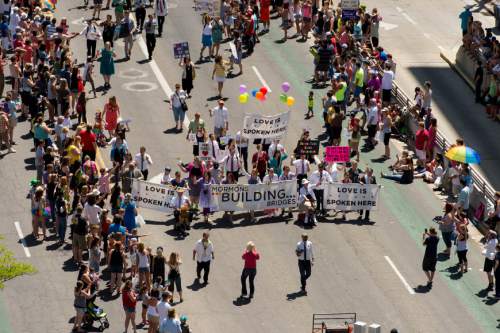This is an archived article that was published on sltrib.com in 2015, and information in the article may be outdated. It is provided only for personal research purposes and may not be reprinted.
For a second consecutive year, Mormons Building Bridges will not be allowed to march in Utah's Days of '47 and Freedom Festival parades.
Organizers have rejected the group's applications to participate in the two July celebrations.
Erika Munson, who co-founded Bridges in 2012 with the sole goal of fostering ties between faithful Latter-day Saints and the LGBT community, expressed disappointment with the decisions.
Munson believed her group's message of inclusion and love — consistent with the values espoused by The Church of Jesus Christ of Latter-day Saints — would persuade parade officials to welcome Bridges.
"We were hoping that last year we really got a conversation going," Munson said, "and that this year, a lot of the unwillingness to look at the LGBT community as part of our community would fall away."
After all, Utah has since adopted landmark legislation protecting lesbian, gay, bisexual and transgender individuals from housing and job discrimination while also safeguarding some religious liberties. With the LDS Church's blessing, the law won overwhelming support on Utah's Capitol Hill.
"It sets Utah apart and indicates a willingness for people to work together when they put their heads together," Munson said. "I'm afraid that the parade committees for Days of '47 and the Freedom Festival are isolated, which is a shame. These need to be parades for all of Utah."
Greg James, executive vice president of the Days of '47, said the parade committee's decision is based on its contention that Bridges is an advocacy group.
Rules for the July 24 procession in downtown Salt Lake City don't allow for advocacy of any kind — "whether it's a group you might agree with or don't agree with. We don't do anything that's advocacy. This one is advocacy."
Last year, the parade denied Bridges' float application, arguing the group is too controversial — a move that had the Salt Lake City Council considering a boycott of the annual procession.
Alan DeWitt, chairman of the July 4 Freedom Festival Grand Parade in Provo, was unavailable for comment Friday, a spokeswoman said.
Both celebrations are operated by private nonprofit foundations.
The Days of '47 Parade, which marks the 1847 arrival of Mormon settlers at the Salt Lake Valley, is Utah's largest parade.
The LGBT community's Pride Parade, planned for June 7, is the second biggest.
Mormons Building Bridges, with hundreds of marchers, has quickly become a popular staple in the Pride Parade and will be there in full force again this year. The grass-roots group, which is not directly affiliated with the LDS Church, is nonpartisan and weighs in politically only to support legislation backed by the faith.
In keeping with the "Pioneers — Forging a New Frontier" theme of the 2015 Days of '47 Parade, Bridges had proposed a "Utah's LGBT Pioneers" entry, featuring six LGBT community leaders from business, education and public service riding in an antique convertible.
Marching military veterans who are gay or transgender were planned for the Freedom Festival. Neither proposal pushed for any political or social issue, Munson said, adding that parades should reflect the larger community.
That doesn't happen, she said, when some are kept out.
The Bridges steering committee is now encouraging the group's 6,000 Facebook members to contact parade organizers, Salt Lake City and Provo officials, as well as major corporate sponsors of both events — Nu Skin and Zions Bank — to express their concern about the lack of inclusiveness.
The hope, Munson said, is that raising the issue with corporate and community decision-makers will foster dialogue about ways to widen the appeal of, and participation in, the Days of '47 and Freedom Festival festivities.
"Corporate sponsors tend to be more interested in the public at large and what they think," she said, "and what it means to have their [corporate] name attached to these parades."
In fact, the business presence in the Pride Parade has skyrocketed in recent years.
The Pride Parade provides "an excellent example," Munson said, "of what this sort of inclusion is all about."



